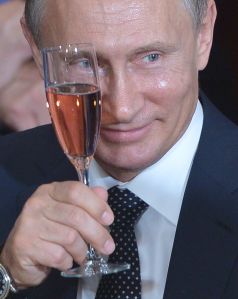
Vladimir Putin is one of those characters we love to hate. He is obnoxious. He never apologizes. He acts to preserve Russian interest without concern for blowback. He does not care about international media optics.
The recent announcement that Russia is pulling out of Syria is a perfect example of Putin-ism. The announcement was the media equivalent of a massive tsunami. No one expected it to happen and it caused tidal waves of incredulity around the world.
But in reality, Russia isn’t pulling out of Syria.
Putin is the exact opposite of Barack Obama. Obama is still considering and wavering about what to do in Syria. Putin determined what was needed and did it. He is now moving on to the next stage of the plan that will allow him to achieve his larger objectives. The United States, meanwhile, is still trying to figure out what its goals are.
Russia is only a pulling out some of their ground forces. If Russian ground forces stay in Syria too long, they will take casualties and that is hard to sell at home. Even worse is Russia’s forces on the ground could become a unifying and motivating power for all the other local groups involved in the quagmire called Syria.
Take a look at who and what Putin is leaving in place in Syria. Seeing the list makes his next move crystal clear.
Putin is keeping total control of the Russian port in Tartus, its naval headquarters in the Mediterranean and the Middle East. From Tartus, Russia can listen in on and control all their assets and their forces as they roam throughout the region. They can listen to almost everything that happens with everyone else throughout the entire Middle East. Tartus is a huge strategic asset for Russia. Creating the port was one of Putin’s major goals from the very beginning of his Syrian operation.
Securing a presence in Syria for the specific purpose of monitoring the Middle East was Putin’s plan from the beginning. He was never interested in propping up Assad.
Putin will also be keeping the newly Russian-built air force bases in Latakia and Hmeymim. Each of these bases houses dozens of fighter jets. When you add those jets to the 30 to 40 jets on the Russian aircraft carrier which is off the coast of Tartus, the number of Russian fighter jets around Syria reaches about 70 to75.
This may be a reduction but it is hardly a withdrawal.
Soon after the announcement was made, Russian Foreign Minister Sergei Lavrov met US Secretary of State John Kerry in Amman, Jordan. The focus of their meeting was the cease fire in Syria. But, in reality, it was just a bone the Russians threw to placate the United States which feels that it is out of the loop. Russia is just going thru the motions of keeping the US informed.
Ultimately, Putin has been keeping Bashar Assad of Syria in power.
With Assad in power, Putin could build Russian infrastructure. Russia does not feel that Assad, on his own, has the power to stay—but they need him in place and they will keep him there until a better situation emerges. That better situation may very likely be a splitting of the country into cantons or federations. A canton for Kurds, a canton for Alawites (which is Assad’s clan), a canton for Hezbollah on the Golan Heights and a canton for the Sunnis.
Russia does not want either ISIS or al Qaeda to take control of the Sunni canton. The Islamists are too explosive and too unpredictable. Russia also wants Iran to send back the Revolutionary Guards and have Hezbollah resume its role in confronting ISIS and al Nusra, the al Qaeda group in Syria. Let Hezbollah and Iran do some of the heavy lifting.
This transition will allow Putin to continue exercising control over Syria with less risk. He will continue to use his air force and continue to attack all those who challenge Russian assets. The Russians will not endanger their own special forces on the ground.
For now, Russia has achieved it goals. They have built a real and a permanent presence in the region. They do not need Assad. They want regional control.
Putin is in constant communication with Israel, assuring Netanyahu that the security of Israel is a priority. Israeli President Rivlin was visiting Moscow discussing the Russian agenda—and Israeli Prime Minister Netanyahu was invited to Moscow to continue the conversation in a few days.
Assad, for his part, will beg Hezbollah and Iran to increase its forces in his country.
But in the end, with or without Assad, no one will unseat Russia from its new stronghold in Syria.
So, yes, Russia is scaling down in Syria. But what they are really doing is securing their assets and saying “let everyone else battle it out while we move into our new status and watch and monitor everything in the region.”
Securing a presence in Syria for the specific purpose of monitoring the Middle East was Putin’s plan from the beginning. He was never interested in propping up Assad, keeping peace or reducing the death of innocents. His real goal was to establish Russia as a international power.
Unfortunately, most of the world—especially the United States, never saw it coming. That’s a good reason people love to hate Putin.

